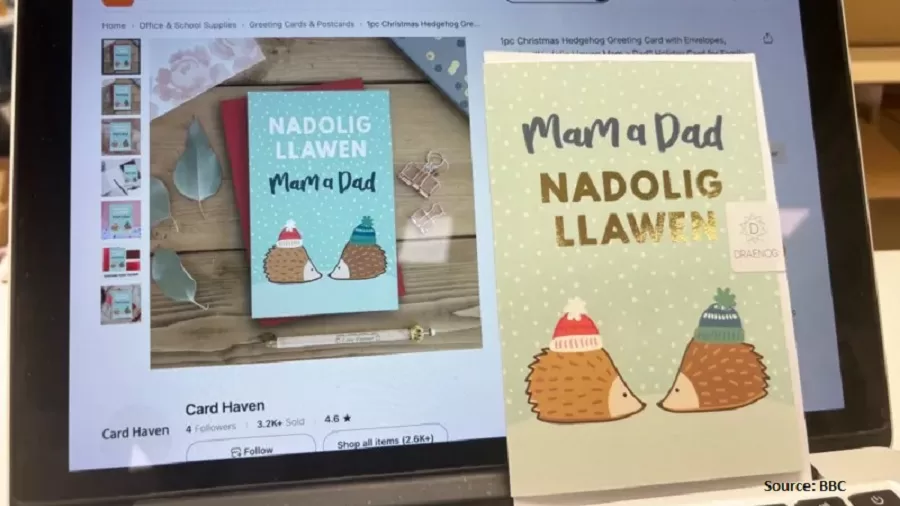Brands Social
Temu Removes Copied Designs After Small Business Owner’s Complaint

- A small business owner realised her designs were being marketed on Temu without her authorisation, exposing the problem of intellectual property infringement among small enterprises.
- Temu moved quickly to remove the infringing products, but the event highlighted the difficulties small businesses have in safeguarding their intellectual property.
- The Federation of Small Businesses advocates for improved dispute resolution mechanisms and greater support for small businesses coping with intellectual property violations on large platforms.
Anwen Roberts, the proprietor of Draenog, a design studio situated in Caernarfon, Gwynedd, was saddened to learn that her distinctive Welsh language card designs were being offered on Temu, a prominent online store, without her knowledge or consent. The event has highlighted the issues that small firms confront when it comes to securing their intellectual property in a world dominated by large e-commerce platforms.
Temu, a marketplace owned by Chinese company PDD Holdings, enables third-party retailers to offer their items directly to buyers. Anwen’s unique card designs were recently discovered on the marketplace, with similar duplicates sold to customers. The cards in question had Welsh pleasantries such as “nadolig llawen mam a dad” (Merry Christmas Mum and Dad) and “penblwydd hapus” (Happy Birthday), as well as artwork that resembled Draenog’s original designs.
While Temu promptly responded and deleted the illegal products from its website when the problem was notified, the occurrence left Anwen devastated. She expressed anger with how easily major businesses can imitate and sell small business ideas, emphasising the challenges that independent designers and entrepreneurs confront in securing their work.
The Pressure on Small Businesses
The emotional and financial cost to small firms like Draenog is substantial. Anwen described the experience as a “massive shock,” particularly for a tiny business that devotes substantial time and work to developing distinctive products. The cards on Temu were nearly identical to Draenog’s, right down to the precise designs and greetings.
This is not a unique instance. According to the Federation of Small Businesses (FSB), about one out of every five small businesses has experienced intellectual property (IP) infringement on huge e-commerce platforms. Many small business owners feel powerless when their designs and products are copied by larger corporations, and there are few options for promptly and successfully resolving such conflicts.
Small business entrepreneurs may find securing their intellectual property to be a difficult task. Anwen expressed annoyance with the time and effort required to locate and report infringement situations. Unlike larger organisations with dedicated legal teams, small businesses can struggle to negotiate the complex realm of intellectual property protection.
Temu Responds to Intellectual Property Concerns
In reaction to the matter, Temu indicated that they moved quickly after receiving allegations of suspected intellectual property violations. The corporation emphasised its dedication to safeguarding the rights of artists and brands. Temu’s platform is primarily reliant on third-party sellers, and as part of their efforts to combat IP violations, they claim to have invested in improved methods for detecting and correcting infringements.
The business also stated that merchants who frequently break IP rules will be permanently blacklisted, with their products withdrawn from the platform. Temu stated that they resolve over 99% of removal requests within a few days, outperforming the industry average.
While Temu’s measures in this case were prompt, the broader issue of IP protection on e-commerce platforms remains. Many small businesses do not have the resources to take legal action or spend time negotiating the difficult process of safeguarding their work across many platforms.
Calls for Better Protection for Small Businesses
Fflur Elin, a spokesperson of the Federation of Small Businesses, emphasised the persistent issues that small businesses confront when dealing with infringements on big platforms. She emphasised that small businesses frequently feel insecure and unprepared to cope with disputes with larger corporations.
The FSB advocates for a system that makes dispute resolution more accessible to small firms and major e-commerce platforms, with the expenses of addressing these concerns funded by the platforms themselves. This would help level the playing field for small firms, which frequently lack the resources to advocate for their rights.
Government and Legal Support
The UK’s Intellectual Property Office (IPO) has acknowledged that intellectual property infringement is a global concern, and is collaborating with major e-commerce companies to address the rising problem. The IPO recommends business owners use the reporting mechanisms provided by these platforms to ensure that infringements are correctly identified and investigated. They also work with e-commerce behemoths like Temu to permanently remove persistent merchants and prevent counterfeit items from entering the market.
While these efforts are significant, many small business owners continue to face challenges. Without clear, consistent support and a system that prioritises the interests of independent artists, small companies will continue to confront major hurdles in safeguarding their hard-earned work from infringement.
The Bigger Picture: E-commerce and Intellectual Property Infringement
As global e-commerce platforms such as Temu grow in popularity, small firms face increased dangers of intellectual property theft. With billions of products sold each day, tracking and enforcing intellectual property rights might feel like an ongoing war. As more consumers choose online marketplaces for convenience and cost-effectiveness, small company owners face an increasingly complex and competitive terrain.
For the time being, Anwen Roberts and other small business owners must continue to advocate for their rights, seeking out available tools and help while advocating for systemic improvements that make intellectual property protection easier and more efficient.
As the online retail industry expands, platforms, politicians, and entrepreneurs must collaborate to guarantee that small businesses’ originality and hard work are valued and protected.


















































